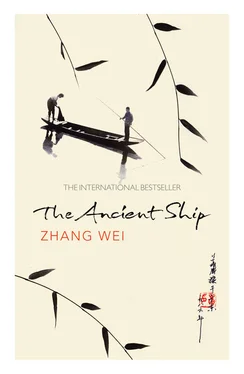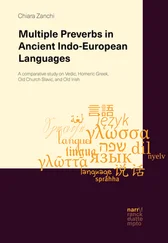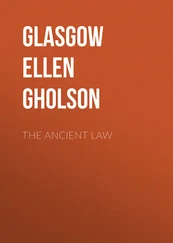In the end, Xiaokui shed her mourning garments, and a huge sigh of relief was let out all over town. The mill seemed to turn faster; the color returned to Xiaokui’s face. She was often seen in Zhao Family Lane with Leilei in her arms.
They met once. Her burning gaze made Baopu lower his head and hurry away. From then on he avoided the ancient lane. On another occasion he saw her deep in conversation with Sui Buzhao, who was nodding, his tiny eyes shining. Later that night his uncle came to his room and smiled as he fixed him with a stare. Baopu could barely keep himself from sending the old man away. But then his uncle said, “Tis is your lucky day. It’s time for you to have a family. Xiaokui—”
A shrill shout burst from Baopu’s throat, to his uncle’s astonishment. With a cold, hard look, Baopu said, exaggerating every word: “Don’t mention that to me ever again!”
Ever since his teens, Baopu had been unhappy with his uncle, owing mainly to the day he had tried to tempt Jiansu into going out into the river with him on a boat that immediately sank, scaring Baopu half to death. A later incident only increased his disgust for the man. Early one cold morning, during the lunar New Year holiday, Baopu and Guigui rose early to celebrate, as custom dictated. First one, then the other washed up with bath soap they kept in a small wooden box, filling the small room with a pervasive fragrance. Guigui urged him to wear the leather, square-toed shoes left to him by his father. The sky was lightening, but the streets were still deserted. In a campaign to do away with superstition, officials had forbidden the use of firecrackers and paying New Year’s calls. So Baopu summoned Hanzhang and Jiansu to his room and had Guigui go for their uncle while they placed dumplings with yam fillings on a cutting board. Guigui had not been gone long when cracking noises erupted on the street. At first they thought someone was setting off firecrackers, but Jiansu ran out to see what it was and reported that a couple of local carters were riding up and down the streets, their heads beaded with sweat as they snapped their whips in the air.
Water boiled in the wok as they waited for their uncle. But Guigui returned alone, red eyed, and said she’d pounded on their uncle’s door, but he was inside snoring away. When he finally woke up, he refused to get out of bed. Even when she told him they had prepared dumplings, he said he wasn’t getting up, not for anything or anyone. She stood there until water began dribbling out under the door onto the ground, and it took only a moment to realize that he was on the other side relieving himself. She came straight home and announced that she never wanted to see that man again. Baopu and Hanzhang were beside themselves, but Jiansu merely looked out the window and said, “That uncle of ours is really something!”
As he dumped the dark dumplings into the boiling water, Baopu summed up his view of the man: “He’s the sinful member of the Sui clan.”
Baopu’s uncle stood in his room that day wanting to continue with what he’d come to say about Xiaokui, but the determined look on Baopu’s face kept him from doing so. Caught off guard by his nephew’s attitude, he turned and left, stumbling along as always, with Baopu’s eyes boring into his back; he wondered if the old man had learned of his wretched secret.
Much later that night, Baopu was out pacing the yard. Finally, unable to restrain himself, he went to his brother’s room and knocked on the door. Wiping his sleepy eyes, Jiansu let him in and lit a lamp. “I couldn’t sleep,” Baopu said. “I have to talk to someone. I’m really depressed.”
Jiansu, dressed only in a pair of shorts, crouched down on the kang, his skin glistening in the lamplight, as if oiled. Baopu took off his shoes and joined him on the kang, sitting cross-legged. “I’ve been there,” Jiansu said, “I know how it feels. But time took care of it. If I’d carried on like you, I’d have been skin and bones by now.”
With a forced smile, Baopu said: “I guess I’ve gotten used to it. I’m in the habit of feeling sinful. I’m used to suffering.”
The brothers smoked in silence until Jiansu, pipe in hand, lowered his head and said, “There’s nothing worse than waking up in the middle of the night. There are so many things on your mind at this time of night that if your thoughts take an ugly turn, you can forget about getting any more sleep. Going outside and letting the dew wet your face helps a little. Or, if your heart seems on fire, you can pour cold water over your head. I hate waking up in the middle of the night.”
Seemingly oblivious to what his younger brother was saying, Baopu asked, “Jiansu, who would you say is the most sinful member of the Sui clan?”
With a grim laugh, Jiansu replied, “Didn’t you say that’s what our uncle is?”
Baopu shook his head, tossed away his cigarette, and looked at his brother without so much as blinking.
“No, it’s me!”
Jiansu shoved the pipe back in his mouth and bit down hard. He gave his brother a strange look. “What are you talking about?” he said with an angry frown.
Baopu rested his hands on his knees and arched his wrists. “I can’t tell you now, but believe me, I know what I’m saying.”
With a bewildered shake of his head, Jiansu smiled grimly. Then he took his pipe out of his mouth and laughed. Surprised by that laugh, Baopu frowned. “I don’t know what you’re referring to,” Jiansu said, “and I want to keep it that way. You didn’t kill somebody, did you? Become an outlaw? All I know is that members of our clan are in the habit of making things hard on themselves right up to the day we die. If you’re a sinful man, then everybody else in Wali deserves to be killed. My days are not pleasant—sheer torture, if you want to know—and I don’t know what to do about it. I often suffer from a toothache that makes that side of my face swell up, and I have to stop myself from picking up a hammer, knocking out every last tooth, and letting the blood flow. What am I supposed to do? Why does it happen? I don’t know. So I suffer. I know I should do something about it, but I don’t. Sometimes I feel like picking up a hatchet and cutting off my hand. But what good would that do? I’d be gushing blood and rolling around the ground in agony, minus a hand, and drawing a crowd of people whose only reaction would be to look down on me for being a cripple. I just have to put up with things the way they are. That’s the punishment for being born a Sui! During the crazy times a few years back, Zhao Duoduo came into our yard with a bunch of men and a steel pole with the idea of digging up buried treasure left by our ancestors. That was like stabbing me in the chest. I watched them through the window and—I’m not joking when I say this—I cursed myself the whole time. Myself, not Duoduo and his men, and I cursed our ancestors for their blindness in setting up a noodle factory on the banks of the Luqing, ensuring that future generations could neither live nor die well. As I grew into adulthood I imagined myself with a wife, just like everybody else. But what woman would willingly marry into the Sui clan? You were married once, so you know what I mean. Nobody gives a damn about us. They see we’re alive and breathing and never give a thought to what our lives are like. You’re my brother, look for yourself, just look!” Jiansu’s face was red. Tossing away his pipe and knocking his pillow to one side, he crawled under the covers to fetch a little book with a red cover. He opened it, and several photographs of women fell out, all local women who had married. “See those? They were all in love with me, all former lovers, and all were stopped from marrying me by their families. Why? Because I’m a Sui! One after the other they married someone else. One married a man in South Mountain who then hung her up from the rafters. I can’t forget them. I look at their photos at night and meet them in my dreams.”
Читать дальше












